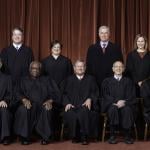Nobody gets on my nerves like sanctimonious moderates. You know, the kind who are religiously committed to maintaining an absolutely mathematical balance on their facebook wall between criticisms of Republicans and Democrats. One of my seminary friends has a blog where she describes herself as “the opposite of moderate.” I just think it’s intellectually lazy to assume that the average of opinion must be right. I believe there are times to be measured and times to be radical and no set formula for determining which time is right for which. So I don’t want what I’m about to say to come across as a sanctimonious moderate statement. But I’ve been pondering the schismatic talk within the United Methodist Church of late and feeling convicted about my own glib, unhelpful contribution to it. I don’t want us to break up. I’m not a moderate. I’m a progressive who needs to be in covenant with conservatives.
Ten years ago, I decided that I was going to go on a rock and roll music tour. I was about to start a master’s program for teaching so there was a brief interlude in my life in the summer of 2004. It was a very Jack Kerouac kind of adventure. Early in my journey, I ran into a guy named Jamie sitting on the sidewalk playing guitar in Charlottesville, Virginia. I pulled out my harmonica and we started playing blues together. And then Jamie ended up in my car with me heading down to North Carolina since he had family in Hillsborough.
Jamie would join me on a tour of seedy punk rock venues throughout the southeast along with a drummer named Elijah. We ended up calling Jamie “the Monster” for two reasons. One, he had the ability to put away two forty ounce bottles of malt liquor in about fifteen minutes flat. Two, he was an amazing lead guitar player who had no concept of how to play with other people. He just soloed the whole song, and sometimes it worked and sometimes it didn’t. The more malt liquor he drank, the more wildly he played guitar and the less he played with other people.
During a show in a super-dingy punk storefront in Baton Rouge, Louisiana, the Monster was being so monstrous that Elijah just threw down his drumsticks and walked off the stage. All the punk kids who had come out thought our band drama was hilarious. I was able to mediate between Elijah and the Monster, and we managed to come back out and finish our set. This wouldn’t have worked in most music venues, but the kids in Baton Rouge were really laid back.
That disastrous show in Baton Rouge is the image that keeps coming to mind when I think about our contentious conversations between conservatives and progressives in United Methodism. The analogy is very imperfect, but I think a healthy church needs both drummers (conservatives) and lead guitarists (progressives) who respect and value each others’ roles and stay in conversation with each other enough that we’re able to play the same song even though we contribute very differently.
You can’t have a band where every musician is soloing and improvising the entire time. I guess there are some bands that make that work, but their music has always been too avant-garde to appeal to me. You need to have somebody who’s willing to be the conservative, to provide a steady (and perhaps even somewhat boring!) beat and bass-line that the other musicians can interact with and riff from. On the flip side, your band is going to be very dull if nobody is exploring and improvising. The goal is to find the sweet spot that is the perfect tension between steadiness and creativity, to play together in a way that isn’t stiff and regimented, but not so loosey-goosey that no coherent song results. You need both sides of the equation, and very different personalities are required to fill each side.
I may have a unique perspective as a progressive Christian because of my conservative evangelical background, but it matters a lot to me what conservatives think. When I started writing my book this January, I deliberately pulled together some of the most conservative members of our church to read the first drafts of each chapter. I wanted to hold myself accountable to writing in a way that wouldn’t alienate them. We may have some substantive disagreements, but they’re compassionate, intelligent people who don’t love Jesus any less than I do.
I live in the tension of needing to make sense to conservatives while at the same time needing to make sense of a discipleship journey in which I have been mentored and shaped decisively by LGBT Christians. The reason why I think Paul was talking about something different in Romans 1 than homosexuality as such is because I have never met an LGBT Christian who was “filled with every kind of wickedness, evil, covetousness, and malice” (Romans 1:29) like the people Paul was talking about. In following Jesus’ counsel to discern false teachings by their fruit (Matthew 7:15-20), I have actually found the fruits of the spirit from Galatians 5:22-23 in a much higher concentration in the LGBT Christian community, perhaps cultivated under the crucible of their persecution. So I’ve been reading the Bible trying to make sense of that, and I’ve spent the last decade forging out an interpretation that desperately yearns to be taken seriously by a conservative with enough integrity to engage me undismissively. I don’t rest easy in my opinions about what the Bible teaches if they don’t make any sense to conservatives. That’s just the burden that I carry.
And yet there’s an opposite burden to make sense that pulls on me. One thing that frustrates me about some conservatives is that they seem to be unburdened by the need to make sense to people outside the church with whom I desperately want to share a gospel that is actually good news. My progressivism is born of my evangelistic instinct. I don’t want there to be any unnecessary stumbling block that keeps people from encountering Jesus himself on account of Jesus’ followers putting on a performance of religiosity that gets in the way. When the one thing that people in our country associate with Christianity more than anything is its opposition to homosexuality, it makes me want to scream and rip my hair out.
The culture wars have been the most devastating thing to happen to American Christian evangelism in the past three decades. We look like complete assholes to the world (sorry Mom, there just isn’t another word that works), and it’s the opposite of the honest introspection that a grace-defined kingdom is supposed to cultivate for Christians to dismissively blame the “liberal media” for our “image problem.” And yet at the same time, I’m very wary of the temptation to overcompensate in the other direction with an “I’m not like those other Christians” attitude and a “Jesus-lite” message that has lost its capacity to deliver people from captivity to sin and demonic cultural systems. I don’t trust the gospel that I preach unless it’s got a conservative anchor that’s Biblically robust and adequately informed by church tradition.
I feel like the church is a lifeboat trying to rescue a bunch of people that are drowning in a deep, dark sea. Some are called to stay in the boat and hold onto the rope. And some are called to dive deep into the water with that rope tied around our ankles so that we don’t drown ourselves. I’m one of the deep divers. That will be the case even more as I take my new position doing campus ministry at a secular university. But I need that rope around my ankle. I need to be in conversation with conservatives. And not just conversation, but covenant.
Because I care about the covenant I share with other United Methodist clergy and even though this covenant should mean a whole lot more than just following a few particular rules about “chargeable offenses,” I’m willing to commit to not doing anything our Book of Discipline tells me not to do as well as advocating for other progressive Methodist pastors to likewise honor our covenant. For me, that means that if I build a relationship with a same-sex couple in my campus ministry who want to get married, then I put them in contact with a UCC, Episcopal, or Lutheran pastor who can officiate their ceremony. Whether or not it’s right that I should have to do that, it’s worth it to me to stay in covenant.
I respect the fact that there might be pastors for whom drawing the particular line I draw would amount to betraying the community with whom they’re in ministry. But I think there needs to be a progressive voice among those who say that our covenant and our discernment process as a United Methodist body does matter. I don’t think that God is somehow utterly out of relationship with those who disagree with me, which means that despite how obvious it seems to me that they’re being anachronistic and reading the Bible wrong, I ultimately have to trust what the Holy Spirit teaches all of us collectively more than I trust what I’ve heard myself.
If I revolt against the Discipline, then I allow my opponents to change the subject into a question of my integrity and trustworthiness which sabotages whatever softening the Holy Spirit might otherwise enact in their hearts. For the same reason, I don’t think that bishops should sabotage our discipline process (if I’ve said contradictory things in the past, it’s because my thinking is constantly evolving). The conversation would be very different right now if annual conferences were scrambling to fill pastor shortages after dozens of pastors were defrocked when their willingness to marry LGBT people became a genuinely costly cruciform witness. What would district clergy meetings look like if pastors whom everyone had known and loved for decades suddenly weren’t there anymore and everyone could point at the people in the room whose vehement activism was the reason why?
On the other hand, it’s easy to forget that a lot more is at stake here than being able to claim the higher moral ground in an abstract conversation. A lot of congregations would be ruined if we faced a massive pastor shortage from a strong-armed response to clergy rebellion on the LGBT issue. I don’t envy the perplexing position that bishops have been put in, and I think it’s very shameful how presumptuously my fellow bloggers heap scorn on the bishops for failing to be “decisive” and “clear.” I don’t think the process by which these men and women were set aside in leadership roles for our body was utterly bereft of prayer and guidance from the Holy Spirit, nor do I think their decisions or conversations now are happening utterly without the Holy Spirit. When you disrespect the office of bishop, you’re also disrespecting the covenant that you’re supposedly defending from the bishops.
Regardless, I want to stay in covenant and conversation. Yes, we all have different approaches to scripture, different favorite Bible verses, etc. But it’s tremendously ignorant to pretend that these differences can really be lumped into two categories. I have more in common with evangelicals than I do with baby boomer Niebuhrian liberals. Mainline conservatives are completely different than the fundamentalists I grew up with. Some Methodists are ex-Catholics; others are ex-Baptists. Some speak in tongues; some are very suspicious of people who speak in tongues (I’m both).
We need to be talking and learning from each other instead of caucusing and plotting against each other. I know that’s a much easier thing to say than to put into practice. Just know that there are progressives out there who want to stay in covenant with the conservatives who drive us crazy. Not because we secretly think that you’re right, but because we don’t trust that we’re right when we’re not talking to you.










